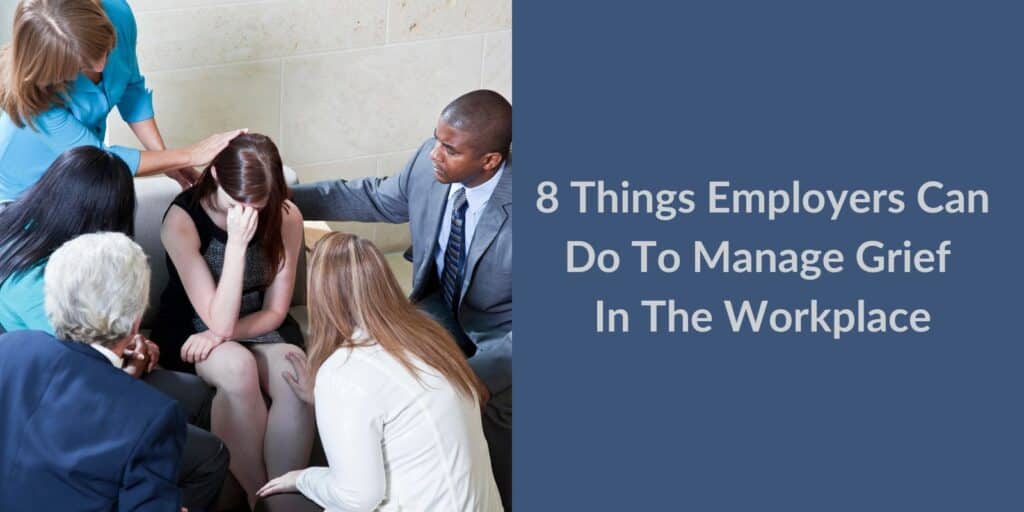Estimated reading time: 5 minutes
We go to work every day and often see the same people. These co-workers are who we do life with – at least while at work.
They are like family to us, and often, we take those relationships for granted.
Losing A Co-worker Can Be Devastating
My daughter recently called to inform me that a co-worker of hers – a young husband and father of two small children was the victim of a violent murder.
My daughter was distraught and overwhelmed with concern for her friend.
Her emotions were those of grief, anger, empathy, and care for the young family he left behind.
She has a very verbal personality, so she was able to talk through this broad range of emotions that she was dealing with while figuring out how to manage workplace grief.
Co-workers Are Like Family
This incident reminded me of the handful of times throughout my career that I had to personally deal with the sudden death of a co-worker and friend.
These officemates were like family to me.
I learned the importance of the workplace providing some support for employees as they work through processing the incident and managing the various stages of grief.
Situations like this affect the climate and productivity of a place of work, making it important for employers to be sensitive enough to take proactive steps to support grieving employees.
8 Things Employers Can Do To Manage Grief At Work
1. Acknowledge the Incident
Sudden death, whether by natural causes or the result of violence, is difficult for everyone.
Acknowledging the facts of what happened is the first step in dealing with the tragedy.
Employers should be proactive and share as much information as is appropriate to employees.
This does a couple of things; first, it helps to control the rumor mill, and second, it demonstrates to the employees that the employer cares enough to share information that concerns them.
For example, providing information about funeral arrangements and how employees can be involved in offering help and support to the family helps employees with planning.
2. Provide Outside Counseling
Depending on the circumstances surrounding the death, having outside counselors that specialize in grief support come to the place of employment and meet with employees can help employees through the grieving process.
The advantage of bringing in a professional from outside the organization is that they offer objectivity and care for employees confidentially.
Allow these counselors to facilitate sessions where employees can verbalize feelings and share difficulties. Healthy conversations with coworkers can be an important part of the healing process.
3. Allow for the Grieving Process
Employers need to allow employees to work through the five common stages of grief, according to PsychCentral – denial, anger, bargaining, sadness, and acceptance.
Everyone processes things differently, and employers that can identify these stages and support employees through them benefit all concerned.
4. Be Flexible With Work Hours
Everyone grieves differently. Be aware and communicate your organization’s support and offer flexible work hours.
Some people would do better being in the office surrounded by co-workers, while others may benefit from being away from the office.
Allow employees the flexibility to grieve according to their personal needs.
5. Communicate the Next Steps
When a co-worker dies, it is important to communicate sensitively what the transition will be.
For example, how the person’s position will be replaced, the process of cleaning out personal items, and how the transition will affect the organization’s day-to-day operation.
Thinking through questions employees might have and answering them before they are asked makes them feel valued.
6. Organize A Memorial
An organized memorial gathering can help bring healing to co-workers.
Plan a time when you can gather all employees and allow co-workers to speak about the deceased employee.
Invite the family as an invitation to participate in the memorial service.
Host refreshments afterward and allow employees to mingle, share stories, and begin the healing process.
7. Honor The Memory of the Deceased Employee
Find a way to memorialize the employee. The options are endless. You may consider a memory plaque on a special wall.
Another idea might be to name a meeting room or office space in their name. Or consider starting a scholarship award in their name.
Utilize the ideas of grieving employees and let them help you brainstorm ideas that could keep the memory of a beloved coworker alive for years to come.
8. Be Sensitive to the Family
I have a sister-in-law who lost her husband suddenly when he was only 39 years old.
As the widow of an employee, she shared the not-always-friendly experience of dealing with her husband’s employer to access death benefits and other logistical issues that needed to be addressed after he died.
This lack of empathy only added stress to an overwhelming situation. She was a widow with four small children. Some compassion could have gone a long way in her grieving process.
It is important to treat the family as tenderly as you would other employees.
Their loss is great, and compassion goes a long way in demonstrating care through a similar situation.
Life Is Unpredictable
Life is unpredictable, and employers are often unprepared for the unexpected sudden death of an employee.
Taking the time to slow the “work-as-usual” and help employees cope with a loss can help the organization go through the natural stages of grieving and return to a state of productivity.
